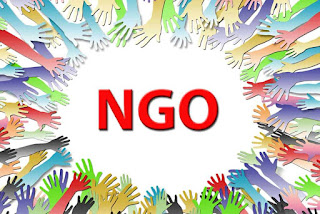ROLE OF NGOs IN INDIA
The World Bank says, "A Non-legislative Organization (NGO) is a private association that seeks after exercises to calm torment, advance the premiums of poor people, secure the earth, give essential social administrations, or attempt network improvement". Any sort of private association, free from government control, can be named NGO, if it isn't for benefit. Customarily, NGO's have 3 significant jobs,
As an implementer
An impetus
An accomplice and facilitator
A definitive objective of a NGO is essentially to supplement the work as an extension of the administration, serve the individuals lining up with objectives of NGO activities and aiding in the general improvement, (human advancement and social advancement records, both).
In recent decades, the NGOs have created as another power assuming an imperative job in molding and usage of participatory and their believability is reliant on their productive job. During the nineties, the development of welfare, strengthening and a philanthropic situated association was the clique. The developing NGO or deliberate division is otherwise called the third area.
The national approach to the deliberate area, embraced in 2007 tries to build up another working connection between the administration and the intentional segment. The job of the intentional part and NGOs can grow just when there falsehoods a very much considered system, useful self-rule and approach direction that supports them. However, once more, there must be a twofold sided exertion on part of the NGOs themselves to assess and screen their very own exhibition.
Worldwide non-legislative associations go back to 1839.however, it was distinctly with the development of the United Nations that the quantity of NGOs expanded multiplied. The real driving elements behind this fast development in the quantity of NGOs can be credited to the part of the arrangement war, developing requests with a superior financial situation, globalization, and strength of unipolar world request post the end of the USSR.
The idea and routine with regards to NGOs go back to the period of patriot and social-political developments. Early instances of such endeavors are the Friend-in-Need Society (1858), Prathana Samaj (1864), Satya Shodhan Samaj (1873), Arya Samaj (1875), the National Council for Women in India (1875), the Indian National Conference (1887), and so forth. The Society's Registration Act (SRA) was affirmed in 1860 to affirm the legitimate status of the developing assortment of non-legislative associations.
As time passed, the NGOs turned out to be increasingly particular and created three noteworthy strands.
National NGO is on of old NGO based in Delhi.
Customary advancement NGOs which significantly turned into a piece of the network they were obliging. They went from town to town to run an education program and empowered nearby craftsmans and ranchers. For example Baba Amte uncleanliness quiet association in India
The subsequent gathering involved those NGOs which campaigned with the administration and requested in the court for improving the lives of the native. For example Place For Science And Environment.
The third strand had a greater amount of an extremist standpoint than having a pacific viewpoint. For example Narmada Bachao Aandolan.
As an implementer
An impetus
An accomplice and facilitator
A definitive objective of a NGO is essentially to supplement the work as an extension of the administration, serve the individuals lining up with objectives of NGO activities and aiding in the general improvement, (human advancement and social advancement records, both).
In recent decades, the NGOs have created as another power assuming an imperative job in molding and usage of participatory and their believability is reliant on their productive job. During the nineties, the development of welfare, strengthening and a philanthropic situated association was the clique. The developing NGO or deliberate division is otherwise called the third area.
The national approach to the deliberate area, embraced in 2007 tries to build up another working connection between the administration and the intentional segment. The job of the intentional part and NGOs can grow just when there falsehoods a very much considered system, useful self-rule and approach direction that supports them. However, once more, there must be a twofold sided exertion on part of the NGOs themselves to assess and screen their very own exhibition.
Worldwide non-legislative associations go back to 1839.however, it was distinctly with the development of the United Nations that the quantity of NGOs expanded multiplied. The real driving elements behind this fast development in the quantity of NGOs can be credited to the part of the arrangement war, developing requests with a superior financial situation, globalization, and strength of unipolar world request post the end of the USSR.
The idea and routine with regards to NGOs go back to the period of patriot and social-political developments. Early instances of such endeavors are the Friend-in-Need Society (1858), Prathana Samaj (1864), Satya Shodhan Samaj (1873), Arya Samaj (1875), the National Council for Women in India (1875), the Indian National Conference (1887), and so forth. The Society's Registration Act (SRA) was affirmed in 1860 to affirm the legitimate status of the developing assortment of non-legislative associations.
As time passed, the NGOs turned out to be increasingly particular and created three noteworthy strands.
National NGO is on of old NGO based in Delhi.
Customary advancement NGOs which significantly turned into a piece of the network they were obliging. They went from town to town to run an education program and empowered nearby craftsmans and ranchers. For example Baba Amte uncleanliness quiet association in India
The subsequent gathering involved those NGOs which campaigned with the administration and requested in the court for improving the lives of the native. For example Place For Science And Environment.
The third strand had a greater amount of an extremist standpoint than having a pacific viewpoint. For example Narmada Bachao Aandolan.




Comments
Post a Comment